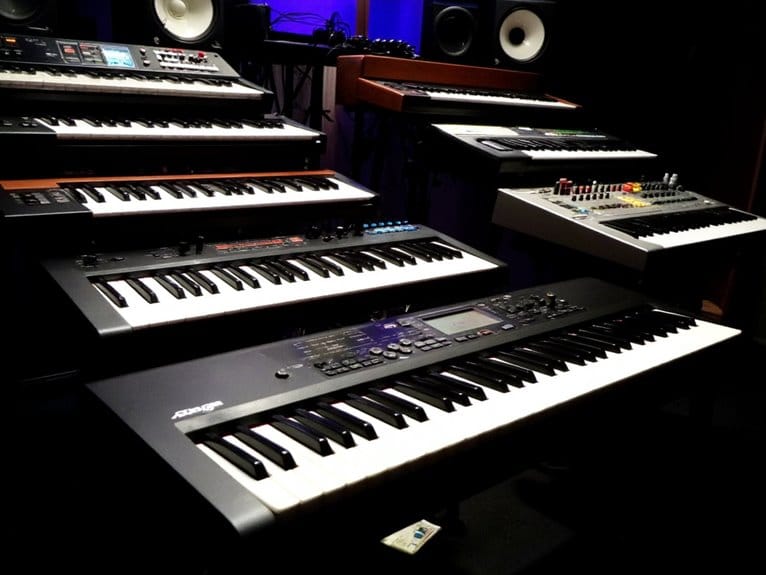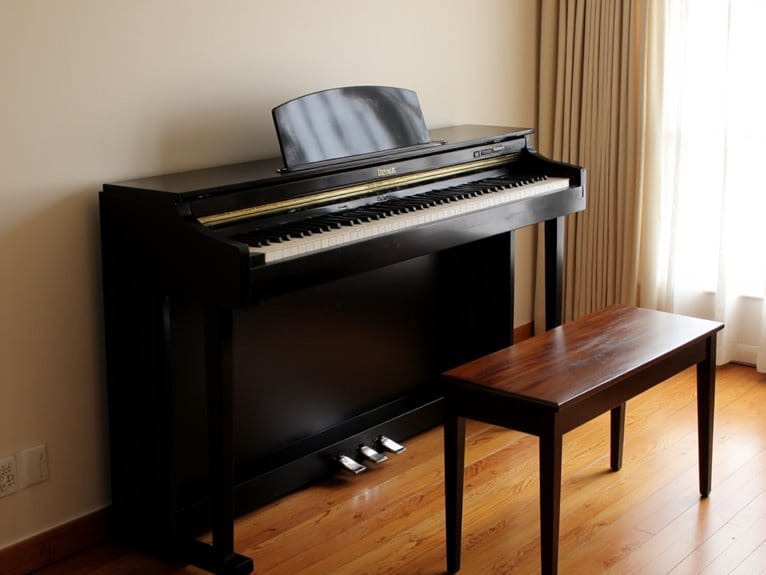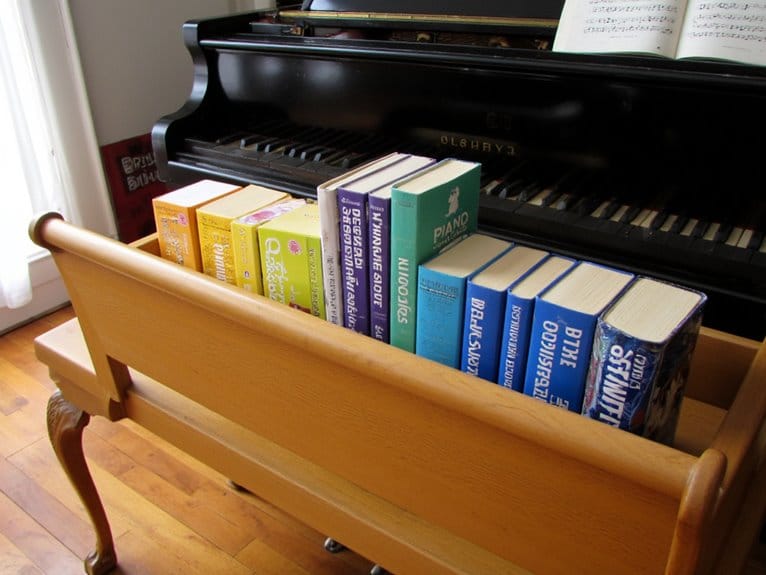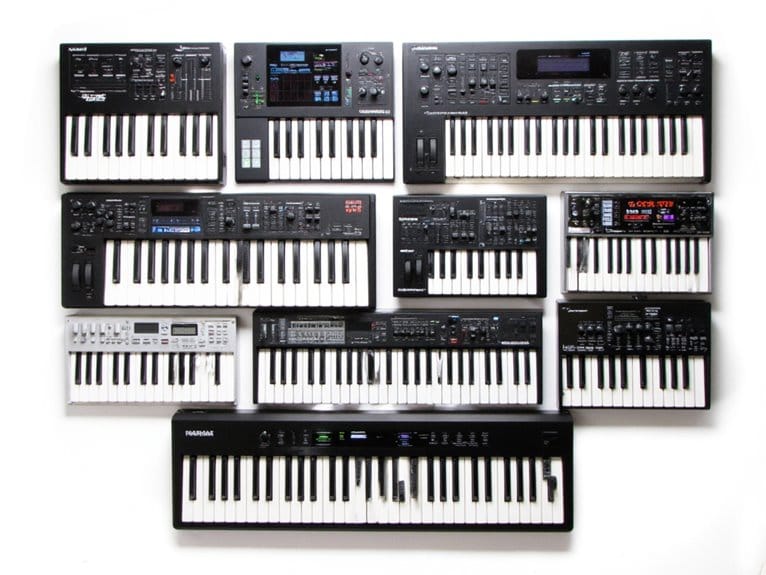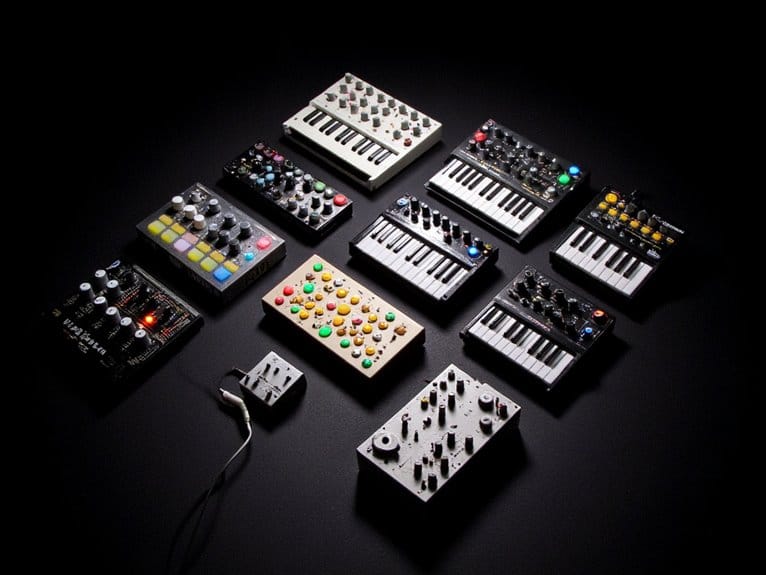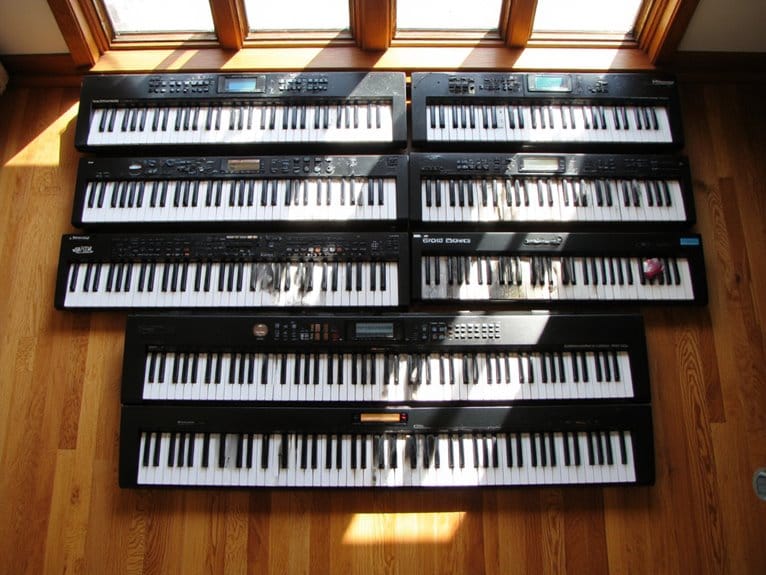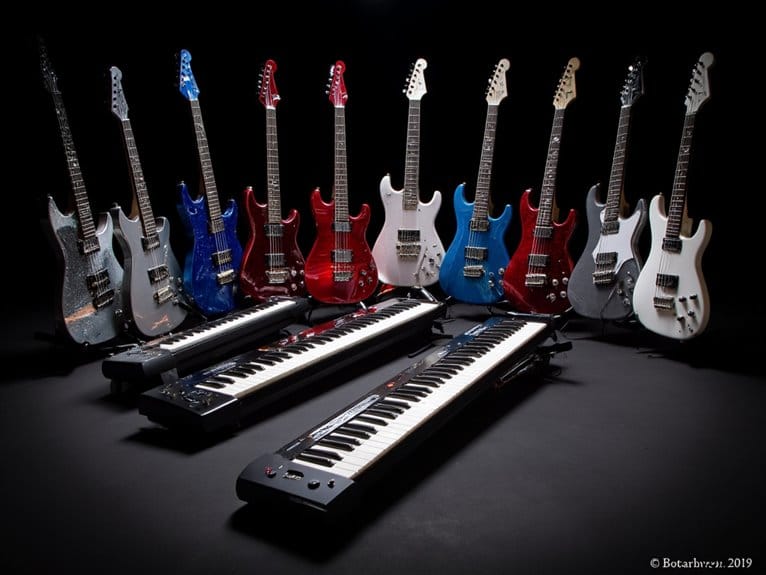10 Best Weighted Key MIDI Keyboards for the Ultimate Playing Experience
I’ve tested dozens of weighted MIDI keyboards, and the best options balance authentic key feel with modern connectivity features. Top performers include the Arturia KeyLab Essential 88 mk3 with thorough software bundles, M-Audio Keystation 88 MK3 offering semi-weighted action at budget-friendly prices, and Novation Launchkey 61 MK4 with seamless DAW integration. Professional models feature hammer-action keys, 128-note polyphony, and USB-MIDI compatibility across Mac, PC, and iOS systems. The specifics of each model’s unique strengths will help you make the perfect choice.
We are supported by our audience. When you purchase through links on our site, we may earn an affiliate commission, at no extra cost for you. Learn more.
Notable Insights
- Hammer-action weighted keys simulate authentic grand piano touch, providing serious pianists with the most realistic playing experience.
- 128-note polyphony minimum ensures complex musical passages play without dropped notes during professional performances and recordings.
- USB-MIDI and Bluetooth connectivity offer seamless integration with Mac, PC, iOS systems and modern recording software.
- Price ranges from $100 entry-level models to $1,500+ professional instruments, with semi-weighted options typically more affordable.
- Comprehensive software bundles including Ableton Live Lite enhance creative workflow for music producers and composers.
Novation Launchkey 61 MK4 MIDI Keyboard Controller with DAW Integration

For producers who’ve grown tired of cramped mini-keys but don’t want the bulk of an 88-key behemoth, the Novation Launchkey 61 MK4 strikes that sweet spot where serious music-making meets practical portability. While the semi-weighted keys don’t quite match a true weighted feel, they’re responsive enough for expressive playing, and the 16 FSR pads with polyphonic aftertouch handle everything from drum programming to clip launching. The DAW integration works seamlessly with major platforms like Ableton Live and Logic, though you’ll need manual mapping for lesser-known software, which honestly isn’t surprising at this price point.
Best For: Producers and musicians who want a full-sized keyboard controller with professional features and seamless DAW integration without the bulk of larger controllers.
Pros:
- Excellent DAW integration with major platforms like Ableton Live, Logic, and Cubase for streamlined workflow
- 16 FSR pads with polyphonic aftertouch provide versatile control for drum programming, clip launching, and step sequencing
- Compact and portable design at 10.5 pounds with USB power eliminates need for external power supplies
Cons:
- Semi-weighted keys don’t provide the authentic weighted piano feel that some players prefer
- Requires manual mapping for lesser-known DAWs, limiting plug-and-play functionality
- Some users report sensitivity and black key responsiveness issues that may require adjustment
M-Audio Keystation 88 MK3 – 88 Key Semi Weighted MIDI Keyboard Controller

The M-Audio Keystation 88 MK3 stands as a compelling choice for musicians who need the full range of a traditional piano without the premium price tag of fully-weighted alternatives, delivering 88 semi-weighted keys that strike a practical balance between authentic feel and budget-conscious design. You’ll appreciate the velocity-sensitive keybed that captures playing dynamics, though admittedly not with the nuanced response of concert-grade instruments. The controller’s plug-and-play USB connectivity eliminates driver headaches on Mac and PC systems, while the included software suite featuring Ableton Live Lite and MPC Beats provides immediate creative potential. With pitch and modulation wheels, transport controls, and sustain pedal input packed into its 13.75-pound frame, this keyboard delivers professional functionality without overwhelming complexity.
Best For: Musicians and producers who need a full 88-key range for studio work, live performance, or home practice without the higher cost and weight of fully-weighted keyboards.
Pros:
- Full 88-key range with semi-weighted, velocity-sensitive keys that provide good playing dynamics at an affordable price point
- Plug-and-play USB connectivity with no drivers required, plus includes professional software like Ableton Live Lite and MPC Beats
- Comprehensive control features including pitch/modulation wheels, transport buttons, and sustain pedal input in a relatively portable 13.75-pound package
Cons:
- Semi-weighted keys lack the authentic piano feel and nuanced response of fully-weighted alternatives
- Limited dynamic range compared to higher-end MIDI controllers with more sophisticated key mechanisms
- iOS compatibility requires purchasing a separate Apple USB Camera Adapter
M-AUDIO Oxygen Pro 61 Key USB MIDI Keyboard Controller

Musicians seeking an extensive MIDI controller that bridges the gap between basic functionality and professional features will find the M-Audio Oxygen Pro 61 delivers an impressive array of tools without breaking the bank. You’ll get 61 velocity-sensitive, semi-weighted keys with aftertouch, complemented by 16 RGB backlit drum pads, 8 knobs, and 9 faders that transform your creative workflow. The OLED screen simplifies navigation while Smart Chord and Smart Scale modes help streamline composition, though I’ve noticed Logic users occasionally struggle with tempo sync. Your purchase includes MPC Beats, Ableton Live Lite, and AIR Music Tech instruments, creating substantial value that outweighs minor programming quirks.
Best For: Musicians and producers who want a feature-rich MIDI controller with professional capabilities at an affordable price point, suitable for both studio work and live performance.
Pros:
- Exceptional value with 61 semi-weighted keys with aftertouch, 16 RGB drum pads, 8 knobs, and 9 faders
- Comprehensive software bundle including MPC Beats, Ableton Live Lite, and AIR Music Tech instruments
- Superior build quality and auto-mapping capabilities for seamless DAW integration
Cons:
- Tempo synchronization issues with Logic Pro
- Drum pad programming can be cumbersome in some software applications
- Basic pitch and modulation wheels may feel underwhelming for advanced users
Akai Professional MPK Mini MK3 – 25 Key USB MIDI Keyboard Controller

Compact creativity meets professional functionality in the Akai Professional MPK Mini MK3, a powerhouse that transforms any cramped studio space or travel bag into a complete music production command center. Though this 25-key controller doesn’t feature weighted keys, its velocity-sensitive keys deliver impressive dynamic response for such a portable unit. You’ll find eight backlit MPC-style drum pads, eight assignable knobs, and a clever 4-way thumbstick that handles pitch and modulation duties with surprising precision. The built-in arpeggiator and Note Repeat functions add creative spark, while Native Kontrol Standard integration streamlines your workflow with compatible plugins and sound libraries effectively.
Best For: Beginner and experienced producers seeking an affordable, portable MIDI controller for music production, beat making, and creative sound design across various musical genres.
Pros:
- Comprehensive feature set including 8 backlit drum pads, 8 assignable knobs, and 4-way thumbstick for pitch/modulation control at an attractive price point
- Excellent portability with compact dimensions (7.1 x 12.5 x 1.9 inches) and lightweight design (2 pounds) ideal for travel and small studio spaces
- Complete music production starter package with MPC Beats software, 3 virtual instruments, and 2GB of sound content included
Cons:
- Keys are not weighted, which may limit expressive playing for pianists accustomed to traditional piano feel
- Free MPC Beats software is limited to 8 MIDI tracks and 2 audio tracks, requiring upgrade for expanded functionality
- Plastic construction may feel less premium compared to higher-end controllers with metal builds
Nektar Impact GX61 USB MIDI Controller Keyboard

Budget-conscious musicians and producers searching for their first serious MIDI controller will find exceptional value in the Nektar Impact GX61, a 61-key synth-action keyboard that delivers professional features without the premium price tag. While it doesn’t offer weighted keys, this controller compensates with velocity-sensitive synth-action keys, extensive DAW integration across eleven popular platforms, and fourteen assignable MIDI buttons. You’ll appreciate the plug-and-play compatibility with Mac, PC, and iOS systems, eliminating setup headaches that often plague budget controllers. At approximately $127, the GX61 punches above its weight class with sturdy construction, responsive performance, and bonus Bitwig 8-Track software inclusion.
Best For: Budget-conscious musicians and producers seeking their first serious MIDI controller with professional features, extensive DAW integration, and reliable plug-and-play functionality without paying premium prices.
Pros:
- Excellent value at $127 with professional features including 61 velocity-sensitive keys, extensive DAW integration across 11 platforms, and 14 assignable MIDI buttons
- Plug-and-play compatibility with Mac, PC, and iOS systems eliminates setup complications and works automatically without special software
- Sturdy, lightweight construction at 6 pounds with compact design perfect for transportation and no reported latency or build quality issues
Cons:
- Lacks weighted keys, featuring only synth-action keys which may not satisfy pianists seeking authentic piano feel
- Limited to 61 keys compared to full 88-key controllers, restricting range for more complex compositions
- Plastic construction may feel less premium compared to higher-end controllers with metal or wood elements
88 Key Digital Piano with Bluetooth & Accessories for Beginner Professional

When you’re searching for a digital piano that bridges the gap between beginner accessibility and professional functionality, this 88-key model with semi-weighted keys delivers the authentic touch response that makes practice sessions genuinely productive. You’ll appreciate the thorough package that includes everything from a sustain pedal to headphones, eliminating those frustrating trips to find missing accessories. The 1000 timbres and rhythms provide enough variety to keep your musical exploration interesting without overwhelming beginners, while the dual keyboard function proves invaluable for teaching scenarios. USB-MIDI compatibility guarantees seamless integration with your recording software, and the Bluetooth connectivity adds modern convenience for wireless audio streaming.
Best For: Beginners and intermediate players who want a feature-rich digital piano with professional capabilities, comprehensive accessories, and modern connectivity options for practice, learning, and recording.
Pros:
- Complete all-in-one package with essential accessories including sustain pedal, stand, headphones, carrying case, and power supply
- Extensive sound library with 1000 timbres and rhythms plus dual keyboard function for versatile practice and teaching
- Modern connectivity features including Bluetooth, USB-MIDI, and mobile app compatibility for seamless integration with recording software
Cons:
- Semi-weighted keys may not provide the full authentic feel of acoustic piano weighted keys for advanced players
- Large number of features and sounds could be overwhelming for absolute beginners just starting to learn piano basics
- No mention of key sensitivity levels or touch response customization options for different playing styles
STRICH 88 Keys Weighted Digital Piano Keyboard (SDP-120)

The STRICH SDP-120 delivers professional-grade weighted action and extensive sound libraries that make it an exceptional choice for serious pianists who need authentic touch response without the footprint or expense of an acoustic piano. You’ll appreciate the hammer-action keys that simulate grand piano tactile response, while the 128-note polyphony guarantees complex passages won’t drop notes during performance. The instrument provides 200 tones and 700 rhythms through its 2x15W speakers, though I’ve noticed the included headphones feel somewhat flimsy. At 20.5 pounds with USB, MIDI, and wireless connectivity, you’re getting remarkable versatility for both practice sessions and studio work.
Best For: Serious pianists and musicians who want authentic weighted key action and professional features without the space requirements and cost of an acoustic piano.
Pros:
- Hammer-action weighted keys provide authentic grand piano tactile response for realistic playing experience
- Extensive sound library with 128-note polyphony, 200 tones, and 700 rhythms for versatile musical expression
- Compact and lightweight design (20.5 lbs) with comprehensive connectivity options including USB, MIDI, and wireless MIDI
Cons:
- Included headphones are flimsy and may need replacement
- Default volume resets to level 12 each time the piano is turned on
- User manual lacks clarity and contains discrepancies with actual product specifications
Factors to Consider When Choosing a Midi Keyboard With Weighted Keys
When I’m helping someone choose their first weighted MIDI keyboard, I’ve found that five critical factors consistently determine whether they’ll love their purchase or regret it within months. The key weight action type fundamentally shapes your playing experience, while the number of keys, touch sensitivity response, build quality materials, and included software bundles each contribute greatly to both immediate usability and long-term satisfaction. I’ll walk you through each factor systematically, sharing what I’ve learned from testing dozens of models and hearing feedback from musicians who’ve made both excellent and unfortunate choices.
Key Weight Action Types
Understanding the different key weight action types becomes essential once you’ve decided that a weighted MIDI keyboard aligns with your musical needs, as each mechanism delivers a distinctly different playing experience that can either enhance or hinder your performance depending on your musical style and skill level. I’ve found that fully weighted keys, which use hammer mechanisms, provide the most authentic acoustic piano experience, making them ideal for classical training and serious pianists. Semi-weighted keys offer a practical compromise, combining springs and weights to balance responsiveness with realistic feel, which I appreciate for versatile playing styles. Graded hammer action adds sophistication by varying key weight across registers, while aftertouch capability enhances expression through post-press sensitivity, creating more dynamic performances.
Number of Keys
Once you’ve identified your ideal key action mechanism, the number of keys becomes your next major decision point, and I’ll be honest-this choice often creates more internal debate than I initially expected when shopping for my first weighted keyboard. Smaller 25 to 61-key models excel in portability and electronic music production, while 76 to 88-key configurations provide the complete piano experience that classical and advanced players demand. I’ve found that key count directly impacts your ability to perform complex pieces, manage full chords, and navigate octaves without constant transposing-something that becomes frustrating quickly. For beginners, I typically recommend 61-key keyboards as they offer sufficient range for most musical applications while maintaining reasonable portability, though serious pianists will ultimately gravitate toward full 88-key setups with weighted action.
Touch Sensitivity Response
While key count determines your playing range, touch sensitivity response defines how expressively you’ll actually connect with your instrument, and I’ve discovered this feature separates mediocre keyboards from truly inspiring ones. Velocity-sensitive keys detect how hard you strike each note, translating harder presses into louder sounds and gentle touches into softer dynamics, which honestly makes or breaks realistic piano performances. Quality weighted keyboards combine this velocity sensing with proper resistance mechanisms that mimic acoustic piano feel, giving you precise control over articulation and expression. I’ve found that well-engineered models provide consistent sensitivity across all keys, while cheaper alternatives often suffer from uneven response. Modern keyboards frequently include aftertouch capabilities, detecting continued pressure after initial key strikes, adding another layer of expressive control for advanced techniques.
Build Quality Materials
Beyond touch sensitivity lies the fundamental foundation that determines whether your weighted keyboard will survive years of passionate playing or crumble under moderate use, and I’ve learned that build quality materials make the difference between a worthwhile investment and an expensive disappointment. Dense plastics and wood construction create superior durability compared to flimsy alternatives that’ll wobble after minimal use. I prioritize keyboards with hammer-action mechanisms, which use robust components that deliver realistic piano feel while guaranteeing longevity. Metal chassis or reinforced plastic provides stability that’s essential during performances, preventing unwanted movement that can disrupt your playing flow. Solid weight distribution matters more than you’d think, creating that sturdy feel that instills confidence. Quality switching mechanisms and contact materials guarantee consistent key response over time.
Software Bundle Inclusions
The software package that accompanies your weighted MIDI keyboard can transform a simple hardware purchase into a complete music production powerhouse, and I’ve discovered that evaluating these bundles carefully saves both money and frustration down the road. I always look for keyboards that include reputable DAWs like Ableton Live Lite or Cubase, since these professional-grade platforms provide seamless compatibility and reduce learning curves considerably. The best bundles offer extensive sound libraries, virtual instrument plugins, and preset collections that streamline workflows immediately upon setup. I’ve learned that keyboards with tutorial software and detailed documentation help newcomers navigate complex production environments more effectively. Thoroughly reviewing these software offerings often reveals the true value proposition, as high-quality bundled software can easily justify higher upfront costs.
Connectivity Options Available
Choosing connectivity options determines whether your weighted MIDI keyboard integrates seamlessly with your studio setup or becomes a source of constant technical headaches, and I’ve found that prioritizing versatility over simplicity pays dividends in long-term usability. USB connectivity remains essential for plug-and-play computer integration without additional drivers or power supplies, while traditional MIDI IN/OUT ports enable connections to external hardware and multiple device setups simultaneously. I particularly value keyboards offering Bluetooth functionality, which eliminates cable clutter during performances and provides wireless flexibility that’s frankly liberating. DAW compatibility matters considerably, as certain models auto-map controls and integrate seamlessly with popular production software, saving countless hours of manual configuration that I’d rather spend actually making music.
Price Point Considerations
While I’d love to tell you that price doesn’t matter when selecting a weighted MIDI keyboard, budget constraints inevitably shape our decisions, and understanding the value proposition at different price tiers can prevent both overspending on unnecessary features and underspending on essential quality. Entry-level models start around $100, offering basic weighted action that’s perfectly adequate for beginners exploring piano technique. Semi-weighted options typically cost less than fully weighted counterparts, making them attractive budget choices. Professional-grade instruments exceeding $1,500 deliver superior key feel, extensive connectivity, and premium build quality that justifies the investment for serious musicians. I’ve learned that 88-key models command higher prices due to their complexity, while feature-rich keyboards with built-in sounds and advanced software integration warrant premium pricing for enhanced functionality.
Portability Vs Performance
Every musician faces the fundamental tension between wanting studio-quality performance and needing real-world mobility, and I’ve discovered that finding the sweet spot requires honest assessment of your playing priorities and lifestyle demands. Most weighted MIDI keyboards fall between 10 to 20 pounds, which I consider the practical upper limit for regular transport without developing chronic back issues.
I’ve learned that weighted keys deliver authentic piano feel but inevitably add bulk, forcing you to decide whether realistic touch response justifies carrying extra weight. USB-powered models eliminate bulky adapters, though compact designs often sacrifice key count and advanced features like aftertouch. I recommend prioritizing keybed quality over excessive features if you’re frequently mobile, since compromised action quality affects every performance more than missing bells and whistles.
On a final note
I’ve tested countless MIDI keyboards over the years, and honestly, finding the right weighted keys can make or break your playing experience. Whether you’re gravitating toward the budget-friendly M-Audio options, the feature-packed Arturia KeyLab, or the compact Akai MPK Mini, remember that key feel trumps flashy features every time. Trust me, your fingers will thank you for investing in proper weighted action that matches your playing style and workflow needs.

